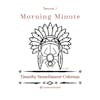

Join the participants of SAGE USA as they discuss the many definitions of "Community" and how to stay engaged in society in your older ages.

Title: “How “Do You define Community?”
Guests: The LGBTQ+ Older adults of SAGE USA
(Disclaimer: Participants have changed their names for safety reasons) Over the summer of 2023, Coleman Global partnered with Sage USA to bring "The Colors of Sound" podcasting workshop to LGBT+ older adults in New York City.
The intergenerational sessions focused on ‘Finding Your Point of View’ (POV) and the art of storytelling.
@ColemanGlobal, @SAGEUSA, @sageusa-lgbtq
#TakeBackMonday, #Purpose, #Service, #Community, #People, #InnerCircle, #QuoteOfTheDay, #community-service, #bronx, #smallbusiness, #newyork, #black, #positivevibes, #learning, #workshop, #intergenerational, #podcasting, #LiveBrave, #intergenerationalprogramming, #technology, #LifeLearner, #ColemanGlobal, #LGBTQ+
--- Send in a voice message: https://podcasters.spotify.com/pod/show/wdon1204/message Support this podcast: https://podcasters.spotify.com/pod/show/wdon1204/support
In a world where so many things are vying for your time, I just wanted to say, Thank You for your attention.
In Unity,
Timothy
Timothy Coleman (00:01.642)
Over the summer of 2023, Coma Global partnered with Sage USA to bring the Colors of Sound podcasting workshop to LGBT plus older adults in New York City. The intergenerational sessions focused on finding your point of view and the art of storytelling. Each week, participants crafted their own topics for discussion, developed their own questions to help move the conversations along, spoke about podcasting equipment, and had brief discussions on how to market podcasts online.
Throughout the workshop series, the participants shared their personal stories of both struggle and of triumph. We laughed about the things that are common in society and debated those things that divide our global community. Welcome to the Colors of Sound podcast. You are now a part of the conversation.
Timothy Coleman (00:51.771)
Yeah, yeah. As I've grown into my little young adulthood, I've been taking these holidays and trying to make them special for my family and my siblings because after my dad passed, that just like went with him. And there was just a lot of grieving.
and when the holidays would come around, they would just greet. Well, my mom, mainly. And she's the top of the household. So she's just showering some of her feelings. Like, you know, they say when it's raining, that's like they crying up there or something like that. But yeah, that comes down. And that has an effect on everyone in the household. So I've been, you know, doing Christmas myself. I've been decorating with the kids, having them do little Christmas activities. Christmas. I'll get them gifts.
Timothy Coleman (01:44.429)
Do you all make like New Year's resolutions? Like do you have things that you, you know, as you get closer to the end of the year that you like that you normally do like to wrap up the year to start a new year? Do you have any like I don't want to say rituals, but I mean like traditions or anything that you do personally? Yeah, the only thing that I do is to make sure that I have money in my pocket.
Mm-hmm And they say keep pots on the stove, keep food on the stove. Yeah, like the black eyed peas is for this and the collard greens are for money and Wait, wait, what's this about? Black eyed peas for wisdom. Who? Black eyed peas? Yeah. And then they have this thing, they say let a man walk through your door first. Really? Yeah, a man walk through your door. Why would a man walk? That's what they say, it's all for saying that they say for New Year's let a man walk in the house first.
Timothy Coleman (02:37.957)
You still got dirty clothes on. The clothes you got on. That's another thing. I'm like, I'm sorry. I'm not doing no laundry because whatever is there is going to be there the next year. But I do clean the house and stuff like that. But as far as you know, you're not supposed to have dirty. You're not supposed to have laundry, hanging around for the new year. And I'm like, OK. I used to wash my clothes and make sure I didn't have anything for the new year. But now it's like, what the heck?
Yeah, I used to wash my clothes, I used to make sure I had parts on the stove. But you know what, when the year goes by, it's the same thing. Exactly. You know, I'm going to have dirty clothes, I'm going to have parts on the stove. So I just, I mean, I just left them alone, I'm still saying. Yeah. Like, I usually clean, I usually rearrange everything. That's what I do, like, every time I feel like I'm entering a different chapter in my life, I just change my room around.
So when I'm going into a new year, I write down and I remind myself what I did that year or what I'm proud of as well. That's awesome. That's really good. What we used to do, I don't know what we used to do, is like write down, like you said, write down your thoughts and write down what you want to accomplish for the new year. Put it in an envelope and then New Year's Day, open it, read it, and this is what you want to do for New Year's.
dessert dessert? yeah
Yes, she does these sweets. I used to eat them, but I was a fat girl. So I liked it. Really? Oh wow. So what's another favorite sweet that you guys like for the holidays? Champagne. That is not sweet. I like coquito. Oh my god. Do you make it? My neighbor makes coquito. Oh my goodness.
Timothy Coleman (04:42.066)
It's a Spanish drink and it's liquor and coconut milk and oh my god it's so good. If you do it right. Yes. If you do it right. You make it.
You should do it. I mastered making the rice and beans so I think I can do it. Oh my god, that's great. That's great. And I added bits of spinach in there because everyone needs their greens.
Timothy Coleman (05:17.358)
That's good. That's one cake I can't eat. Yeah, the only thing I don't like about Tracelage is the, yeah, well if I do it, because then I'm gonna change it up. Yeah, I'm gonna change it up. It's that carnation milk part. I don't like the taste of that. Carnation, that's what we grew up with. I know, carnation. I know, but it's so forward in that Tracelage cake. Like, it's so milky, I can't.
Yeah.
Timothy Coleman (05:54.411)
What kind of sweets do you eat? Even if it's for the holidays? Do you do you allow yourself anything in the holiday season?
Timothy Coleman (06:04.542)
Sweets first. Sweets, all kinds. You make your sweets? You make your cakes and pie? I make my plate, yes. No, not your plate. Not my plate. Oh, she said it. She just said it. She said it. OK.
Timothy Coleman (06:25.314)
I don't know what you feel about chicken pot pie, sorry. Mmm. You know, but it depends on the brand. It's making me hungry. Because all, like, I like banquet. Chicken pot pie is not. But anything else, it just takes, it tastes artificial or something. It just... Don't take that. I have to admit, it makes a wonderful pot pie. A full? Yeah, a full. Banana pudding. Oh, yeah.
Timothy Coleman (06:57.062)
Have you guys ever put out like a little digital cookbook for the holidays before? No. No? Where everybody had like, you know, would you be willing to submit a recipe? I mean, we could throw that together and then just put it, you know, in a space for people to download, you know? And you can share it around with the other participants and... Oh yeah. I think that would be kind of cool, right? Like if you guys did like...
Just one recipe. I made the first one to get all the recipes. The thing I know now. That sounds like homework. Good man.
Timothy Coleman (07:35.452)
You can't tell. You know what I'm saying? Like...
Timothy Coleman (07:43.022)
Hehehehehehehehehehehehehehehehehehehehehehehehehehehehehehehehehehehehehehehehehehehehehehehehehehehehehehehehehehehehehehehehehehehehehehehehehehehehehehehehehehehehehehehehehehehehehehehehehehehehehehehehehehehehehehehehehehehehehehehehehehehehehehehehehehehehehehehehehehehehehehehehehehehehehehehehehehehehehehehehehehehehehehehehehehehehehehehehehehehehehehehehehehehehehehehehehehehehehehehehehehehehehehehehehehehehehehehehehehehehehehehehehehehehehehehehehehehehehehehehehehehehehehehehehehehehehehehehehehehehehehehehehehehehehehehehehehehehehehehehehehehehehehehehehehehehehehehehehehehehehehehehehehehehehehehehehehehehehehehehehehehehehehehehehehehehehehehehehehehehehehehehehehehehehehehehehehehehehehehehehehehehehehehehehehehehehehehehehehehehehehehehehehehehehehehehehehehehehehehehehehehehehehehehehehehehehehehehehehehehehehehehehehehehehehehehehehehehehehehehehehehehehe
Timothy Coleman (07:50.639)
And those are the people that eat a lot. Right. Those are the people that look like you. Right. You see them on their third plate, and you're like, how's it possible? Yeah. It tends to be town.
SAGE leads in addressing issues related to lesbian, gay, bisexual, transgender, queer and questioning, and other self-identifying members of the community aging. In partnership with its constituents and allies, SAGE works to achieve a high quality of life for LGBTQ plus older people, supports and advocates for their rights, fosters a greater understanding of aging in all communities, and promotes positive images of LGBTQ plus life in later years.
So how do you guys feel about community? What does that word mean to you? It means... I feel like most would assume it means comfort, but in community, unfortunately, there is sometimes. It's like a map, and there's different kind of people.
And people tend to box themselves in, so that's how you look at it. And sometimes people don't feel like they're a welcoming community, but when you find your place, then you know that's your place. If you walk into a room and you feel uncomfortable and you feel like you shouldn't be there, then untimely out of 10, you should get up and go, because you probably don't belong there.
not because something's wrong with you, but you should go where you're welcomed and loved. So, and that, that's community, where all the troubles are the same. I mean, there's so many different ways that can mean, right? It's your family, it's the area you live in, it's your online community, if you're a person that's active online. The only main difference is when you work for someone else, and then you're in a community that you are pretty much depending on maintaining a lifestyle.
Timothy Coleman (09:48.162)
real basic lifestyle. So that's a community that maybe you're not going to get all the warm fuzzies in the atta boy, atta girl kind of a motivator. So it's more of an inward thing. And being with other folks of that community, so there are communities within communities. So it's like, what would you call it, Marie?
Timothy Coleman (10:17.262)
Macro and micro. Right. That's right. Right now, this is very micro.
Timothy Coleman (10:27.31)
Macro. Macro would be the LGBTQ community. Macro would be New York State, United States, the hemisphere, the planet, the galaxy. It's all according to how far you want to go and then how small you want to go. Right now, this is pretty small. Community is togetherness. I like to use the word togetherness when I think of community.
whatever that might be, you know, whatever you think that is your community, whether it's a religious community, you know, or a social community, but it's just togetherness. That's right. And I feel community is trust, people that I can trust in my community. Mm-hmm. You know, so, like she was saying, you can have a small community, and I have a small one, so I feel trust.
Timothy Coleman (11:25.858)
That's good. Have you ever had to walk away from a specific community or a space where you had defined that as community? Absolutely, yes. That's life happening.
community, you know, or you find that the youthfulness of that community no longer applies to you. Right. So you move on, you grow. Some of us get stuck. Yeah. Right there in that same community, you never move. That's true. Because we are afraid, we are comfortable.
And I want you to interject. I'm so glad I heard you all the way through. That was beautifully said. Now it's up to when you come to that epiphany. Aha, this is something about grown. I now need to move on. So from the gathering, it's a three A's. I recently learned the three A's, awareness, acceptance, and action. So you may be aware.
takes a lot to accept and then action. Sometimes the plane is great, sometimes it's small, but sometimes it can take minutes, sometimes it can take decades. That's right. As long as it happens, you know, many of us here, this is definitely intergenerational crowd right now in this podcast, but most of us are warning that.
Time is precious. Yeah, that's right. I think, you know, I like what you said about the awareness, right, I think awareness of anything, like...
Timothy Coleman (13:12.902)
automatically creates a wave of change, even if you don't outwardly act upon it. And I'll keep it, even just the conversation we were just having about the different types of milk, coconut milk, almond milk, this and that, it was just my awareness of reading ingredients and I was like, wait a minute, how can I achieve this with less stuff in it? It's the awareness, but the action.
It's the harder part because sometimes when you have an answer and you know what the action is you have to take Either you really jump on it and you do it or you get intimidated by it and it's like That's gonna unravel a lot of things. Like how do I take act like how do I do it?
And in my estimation, now it's about faith and prayer and spirituality, which isn't religion, but can certainly be religion. But now we're talking about faith and prayer and knowing that we have been on this planet a long time. And for me, this almost seven decades on the planet has taught me.
Sometimes you can't see what you want, but with faith, it will be there. And when it comes, it's right on time. It may not be on your time. It will rarely, let's go ahead and say, ever be on your time. Because faith, you're tapping into something spiritual, and in the spiritual realm, time is different. Right? And that's the difference between planning for something and preparing for it.
You can't always plan for something to happen when you want it to happen, but you can be prepared for it so that when it's the right time for it to happen, you step right into it. I remember I had a community of us, we used to get together on weekends, and we would just party and drink, and we did this every single weekend.
Timothy Coleman (15:20.43)
I mean, everybody went to work, came home from work, got the kids together, did whatever, and we would do this every Friday. It got to a point where I was in my bed when I said, I can't do this no more. I'm tired. I said, I'm tired. So when I stopped going and stopped letting them come to my house, they got upset with me. They really got upset with me. They didn't really wanna speak to me. Because you are good all the time. You are good. They said you was fake.
Timothy Coleman (15:52.667)
Yeah. You know, when someone gets upset with you, it forces them to look at themselves because they're going to say, oh, you think you're better than I am. But, you know, I'm no longer good enough for you, which tries to make you feel guilt. And come back. Because it's uncomfortable for me. Because...
I thought I knew you, we did this together. I thought everything was cool. Now that you're stepping away, what's wrong with me? I can't say that. But now, what's wrong with me? I gotta get you back into the fold. And then I'm thinking that it's, you know, maybe she doesn't wanna participate anymore. They're thinking, like you said, oh, you're too good now? But come on, y'all been doing the same thing every weekend, and it's like, ugh.
I mean, it was one of them got to a point where she smacked me.
He jumped up and smacked me. We started fighting. It was crazy. I was at her house. Telemundo. He said, you think you're better than us? Whatever. What? Yeah, I said, I'm not better than you. I'm better than the problem. She said, you're better than what? I said, I'm better than the problem. And she tore up and smacked me. It was a fight in there, girl. Oh my god. You were all in her head. And you didn't stop. Because that wasn't the first clash. The first clash might have been calling or texting.
then it just got bigger, escalated to a face-to-face and she attacked you. You were supposed to have agreed with her when she first told you to and she was used to you doing that, I'm sure. And then, oh my gosh, yeah. Good for you. That took a lot of courage. Did you go back in the fold with that group of people? No, I never went back.
Timothy Coleman (17:50.578)
Some people wouldn't. Absolutely, if that's my normal. So when you are in a traumatic kind of environment, you start to normalize things. Because everyone's telling you, don't talk about it. Whatever is said here, whatever you see here, stays here. And then becomes a generational thing with not getting the help that you need. That was a domestic violence situation.
So domestic violence isn't just a couple, whether they be homosexual or homosexual, but it's community, like we're talking about. And that community was very abusive. And I'm so glad you were able to walk away. I had to raise my kids. And I sure can raise my kids with a pilot every weekend. Mm-hmm.
Timothy Coleman (18:43.118)
That's, the first part of courage was that you made the change. The second part of courage is that you stayed the course. Once you made the change, you stayed with the decision, right? And I think that's what we were saying from before. That's hard for a lot of people because you fall back into patterns of behavior.
Right? And it's, and it's, you grow accustomed, like you're saying, normalize, you grow accustomed to how someone speaks to you or how someone treats you or, you know what I'm saying? And it becomes the quote unquote norm.
Featured Episodes
Check out the latest podcast episodes from our channel.






















